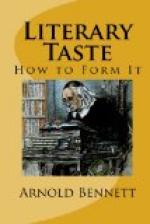and I say that those lines are beautiful, because they give me pleasure. But why? No answer! I only know that the passionate few will, broadly, agree with me in deriving this mysterious pleasure from those lines. I am only convinced that the liveliness of our pleasure in those and many other lines by the same author will ultimately cause the majority to believe, by faith, that W.B. Yeats is a genius. The one reassuring aspect of the literary affair is that the passionate few are passionate about the same things. A continuance of interest does, in actual practice, lead ultimately to the same judgments. There is only the difference in width of interest. Some of the passionate few lack catholicity, or, rather, the whole of their interest is confined to one narrow channel; they have none left over. These men help specially to vitalise the reputations of the narrower geniuses: such as Crashaw. But their active predilections never contradict the general verdict of the passionate few; rather they reinforce it.
A classic is a work which gives pleasure to the minority which is intensely and permanently interested in literature. It lives on because the minority, eager to renew the sensation of pleasure, is eternally curious and is therefore engaged in an eternal process of rediscovery. A classic does not survive for any ethical reason. It does not survive because it conforms to certain canons, or because neglect would not kill it. It survives because it is a source of pleasure, and because the passionate few can no more neglect it than a bee can neglect a flower. The passionate few do not read “the right things” because they are right. That is to put the cart before the horse. “The right things” are the right things solely because the passionate few like reading them. Hence—and I now arrive at my point—the one primary essential to literary taste is a hot interest in literature. If you have that, all the rest will come. It matters nothing that at present you fail to find pleasure in certain classics. The driving impulse of your interest will force you to acquire experience, and experience will teach you the use of the means of pleasure. You do not know the secret ways of yourself: that is all. A continuance of interest must inevitably bring you to the keenest joys. But, of course, experience may be acquired judiciously or injudiciously, just as Putney may be reached via Walham Green or via St. Petersburg.
CHAPTER IV
WHERE TO BEGIN
I wish particularly that my readers should not be intimidated by the apparent vastness and complexity of this enterprise of forming the literary taste. It is not so vast nor so complex as it looks. There is no need whatever for the inexperienced enthusiast to confuse and frighten himself with thoughts of “literature in all its branches.” Experts and pedagogues (chiefly pedagogues) have, for the purpose of convenience,




